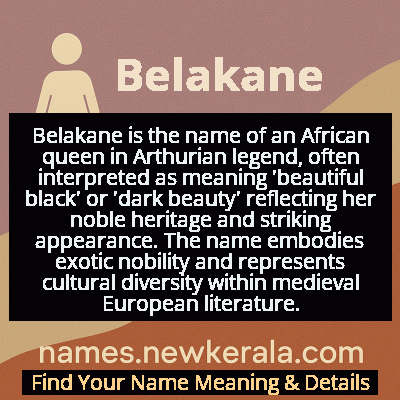Belakane Name Meaning & Details
Origin, Popularity, Numerology Analysis & Name Meaning of Belakane
Discover the origin, meaning, and cultural significance of the name BELAKANE. Delve into its historical roots and explore the lasting impact it has had on communities and traditions.
Name
Belakane
Gender
Female
Origin
Arthurian
Lucky Number
6
Meaning of the Name - Belakane
Belakane is the name of an African queen in Arthurian legend, often interpreted as meaning 'beautiful black' or 'dark beauty' reflecting her noble heritage and striking appearance. The name embodies exotic nobility and represents cultural diversity within medieval European literature.
Belakane - Complete Numerology Analysis
Your Numerology Number
Based on Pythagorean Numerology System
Ruling Planet
Venus
Positive Nature
Harmonious, responsible, caring, and artistic.
Negative Traits
Overly idealistic, superficial, possessive, or jealous.
Lucky Colours
Pink, turquoise.
Lucky Days
Friday.
Lucky Stones
Diamond, turquoise.
Harmony Numbers
2, 3, 9.
Best Suited Professions
Artists, musicians, teachers, healthcare workers.
What People Like About You
Warmth, nurturing nature, artistic flair.
Famous People Named Belakane
Belakane
Arthurian Queen
Queen of Zazamanc in Wolfram von Eschenbach's Parzival, mother of Feirefiz
Belakane
Literary Character
African queen who marries the knight Gahmuret and represents exotic nobility in medieval romance
Belakane
Mythological Figure
Symbol of interracial marriage and cultural diversity in medieval European literature
Name Variations & International Equivalents
Click on blue names to explore their detailed meanings. Gray names with will be available soon.
Cultural & Historical Significance
Belakane's marriage to the Christian knight Gahmuret and their son Feirefiz (who becomes half-brother to Parzival) symbolizes cultural exchange and the possibility of harmony between different civilizations. Her story reflects the complex attitudes toward race and religion during the Crusades era, where admiration for Moorish culture coexisted with religious conflict. As a strong, intelligent, and virtuous queen who rules her kingdom independently before marriage, Belakane also subverts typical gender roles of the period, presenting a model of female sovereignty and agency that was remarkable for her time.
Extended Personality Analysis
Belakane is characterized by remarkable strength, dignity, and intelligence that define her as a sovereign ruler. As depicted in Arthurian literature, she possesses innate nobility and regal bearing that commands respect from all who encounter her. Her personality combines fierce independence with deep capacity for love and loyalty—she rules her kingdom Zazamanc with wisdom and courage before marriage, yet demonstrates profound devotion to her husband Gahmuret.
Belakane exhibits emotional depth and resilience, enduring heartbreak with grace while maintaining her royal responsibilities. She represents the ideal of the 'noble savage' as conceived by medieval authors—possessing natural virtue, beauty, and wisdom untarnished by European courtly corruption. Her character blends exotic mystery with familiar aristocratic virtues, creating a complex figure who transcends simple categorization. As a mother, she shows protective fierceness, and as a ruler, she displays political acumen and diplomatic skill that establish her as a formidable leader in her own right.
Modern Usage & Popularity
In contemporary times, Belakane remains an extremely rare given name, primarily used by enthusiasts of Arthurian literature and medieval history. The name sees occasional usage among parents seeking unique, historically significant names with strong female associations. Its usage is most common in literary and academic circles, particularly among scholars specializing in medieval studies or Arthurian romance. The name has not appeared in modern baby name popularity charts, maintaining its status as an obscure but meaningful choice. Recent interest in diverse representation in historical fiction has sparked renewed attention to Belakane's character, though this has not significantly increased the name's usage as a given name.
Symbolic & Spiritual Meanings
Belakane carries rich symbolic meaning as a bridge between cultures and a challenge to racial and gender stereotypes. She symbolizes the 'other' made noble—representing medieval Europe's simultaneous fascination with and fear of foreign cultures. Her black skin symbolizes both exotic beauty and moral purity in contrast to the sometimes-corrupt European courtly world. As a queen who rules independently before marriage, she embodies female sovereignty and the capability of women to wield political power effectively. Her interracial marriage symbolizes the possibility of harmony between different civilizations and religions, while her son Feirefiz's mixed heritage represents the blending of Eastern and Western traditions. The name evokes themes of cultural exchange, the complexity of identity, and the subversion of expectations.

